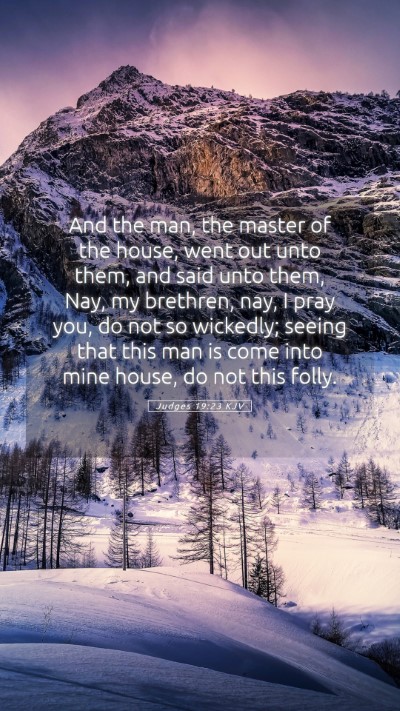Bible Verse Commentary: Judges 19:23
This commentary provides an in-depth analysis, interpretation, and understanding of Judges 19:23, offering insights from notable public domain commentaries, including those by Matthew Henry, Albert Barnes, and Adam Clarke.
Context of Judges 19
This chapter details a harrowing account which ultimately reflects the moral state of Israel during the time of the judges. It presents themes of hospitality, violence, and moral decay, necessitating careful examination of the events and their implications.
Verse Overview: Judges 19:23
The verse reads: "But the man, the master of the house, went out unto them, and said unto them, Nay, my brethren, do not so wickedly; seeing that this man is come into mine house, do not commit this folly." It is crucial to unpack the layers of meaning behind this plea for righteousness.
Meaning and Interpretation
Matthew Henry's Commentary Insights
Henry emphasizes the importance of hospitality as a divine command. The man’s plea signifies his moral obligation to protect his guest, illustrating the social and cultural expectations of the time.
Albert Barnes' Commentary Insights
Barnes notes the gravity of the situation, where the master of the house intervenes to prevent sin. He highlights the societal implications of the verse, showcasing a contrast between the expected law of hospitality and the depravity of the locals.
Adam Clarke's Commentary Insights
Clarke provides historical context, indicating that in this era, the preservation of a guest's honor was paramount. He points out that this response represents a moral high ground against an immoral society.
Theological Significance
Judges 19:23 highlights the fundamental themes of righteousness in hospitality and the moral decline in Israel. It calls believers to uphold biblical values even in the face of societal decay.
Lessons for Bible Study Groups
- Application of Biblical Hospitality: Discuss the significance of hospitality in light of this passage.
- Understanding Moral Responsibility: Analyze the expectations of moral behavior in challenging circumstances.
- Impact of Societal Norms: Explore how societal norms challenge or support biblical values.
Key Takeaways
- Moral Imperative: Protecting the vulnerable is a biblical imperative.
- Societal Oppression: A reflection of societal brutality and the need for righteous individuals.
- Responses to Sin: How one responds to sin reflects their character and values.
Bible Cross References
- Genesis 19:4-8 - The account of Lot and his guests highlights similar themes of hospitality and moral choices.
- Leviticus 18:22 - Addresses the moral laws applicable to the situation.
- Romans 12:9-21 - Encourages believers to hold fast to what is good, applicable to the moral stance in difficult situations.
Conclusion
In summary, Judges 19:23 serves as a powerful reminder of the call to uphold righteousness in a world that often opposes it. The insights from various commentaries enhance our understanding and provide a framework for discussing the importance of biblical values in daily life.


